What is the method for redis to implement session sharing?
Introduction
Many projects in Dachang are deployed on multiple servers. These servers exist in various regions. When we access the service, although the same service is executed, it may be running on different servers. ;
I encountered such a login scenario when I was studying a project. Assume there are three servers as follows (as shown in the picture), and use session to store the user's login information. This information can be used to determine whether the user is logged in:
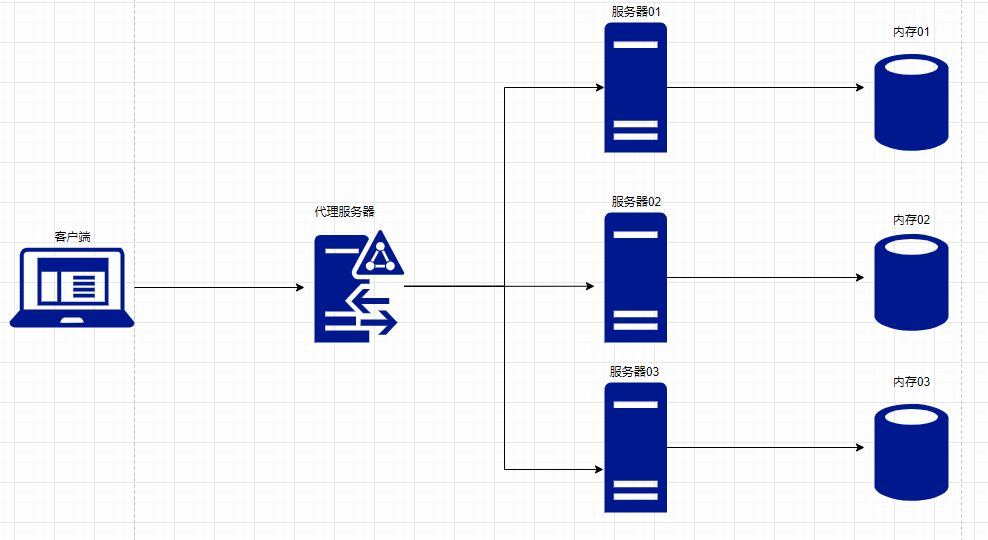
Assuming that this login is executed through server 01, then the login session information this time is stored in memory 01; but when I visit again, it is executed by server 02 operation, but the login session information is in memory 01, and server 02 cannot obtain it, so it will judge that I am not logged in and return the wrong information...
What we want to achieve isthrough a The session generated by server login can be shared with other servers, so how to achieve this?
Solution The idea is that since the memory of these servers cannot be shared, then as long as there is a shared space for these servers to access together (as shown in the picture);
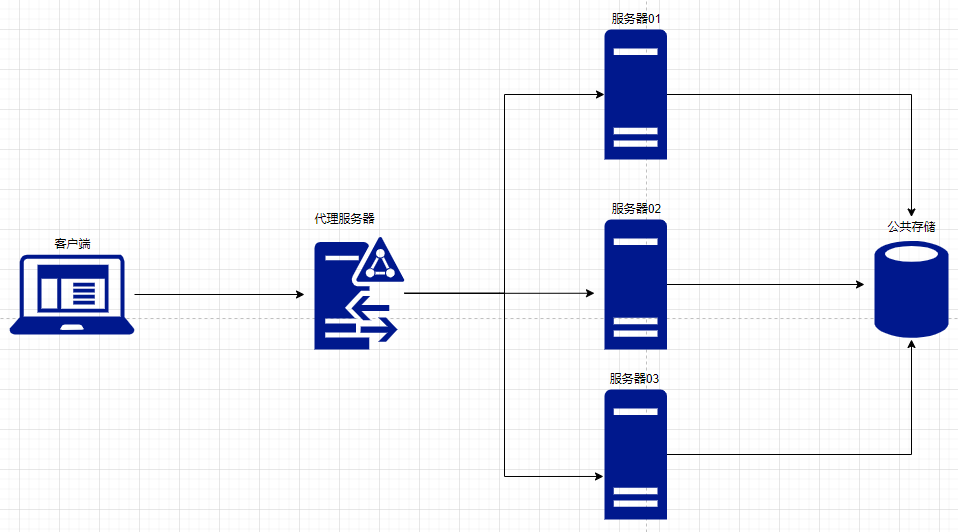
The first thing that comes to mind should be the database. As long as these server clusters share a database and store the generated session information in the database, everyone can access it; Databases include relational and non-relational (NoSql):
Relational database: Mysql, etc.
Non-relational database: Redis (K /V database), etc.
It is actually best to choose a non-relational database here, because Redis is based on memory and has high read and write performance, which is very suitable for this situation where user information is frequently read;
It can also be implemented through the file server, which will not be introduced here;
There is also another method, which can be implemented through iphash of nginx. This method is very simple, but the idea is different from the above two. The principle That is, all requests for the same IP will be iphash calculated by nginx, and the results will be bound to the specified server. After that, this request will access the server.
But there are some problems with this. First of all, load balancing does not make much sense. If the bound server hangs up, then iphash will be invalid; or your request will be distributed by other services instead of the nginx service. , then iphash will also not take effect; so use it with caution;
Below I will simply simulate through code how to easily achieve session sharing through redis configuration
Case introduction
Here is one User management project, when logging in, the login logic code will record the session information of the logged in user:

Then the two services of the project are opened at the same time: localhost:8080 and localhost :8082 (can be used as projects running on two different servers)

After opening the service, you can access the corresponding interface document:
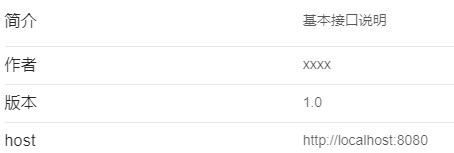
-----------------------------------Dividing line-------- ----------------------------------
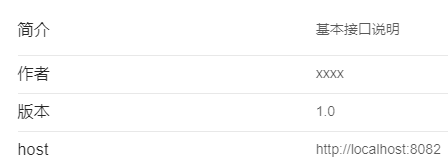
This service has the following two interfaces: (The following tests are tested in the same service)
Login interface: record login user session information
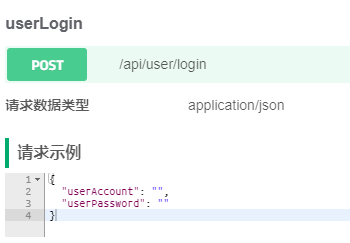
Login test:
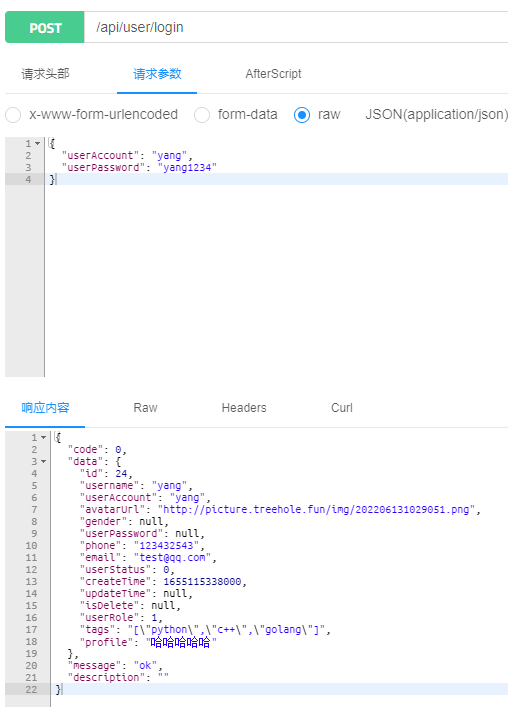
#Get the current user information interface: Get the current user information through the login session

Get the current logged in user Information test:
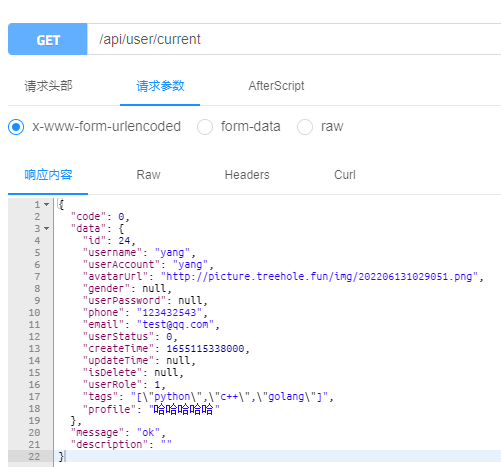
#Because these are two services now, it is definitely not possible to share sessions. Even if the service on port 8080 is logged in, the service on port 8082 cannot be logged in. Obtain the current user information; (I emphasize again: the above test can obtain the current user information because it is tested in the same service. The same service session is stored in its own memory and can of course be accessed by itself)
Specific operations
The following is to implement shared session through redis configuration:
First download redis and find tutorials online; here I directly use the redis container created by docker on the server (simple and easy to use, highly recommended):

You can connect it through the visual tool:
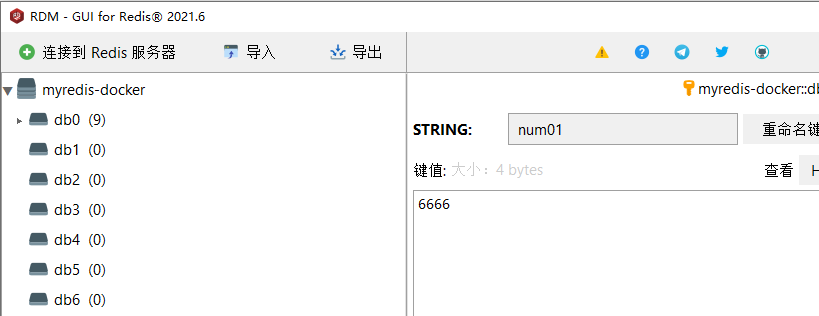
In this way, redis is configured. Now configure redis in the project code:
Introduce redis dependency into the project Depends on the spring-session configuration (automatically stores the session in redis):
<!-- https://mvnrepository.com/artifact/org.springframework.boot/spring-boot-starter-data-redis --> <dependency> <groupId>org.springframework.boot</groupId> <artifactId>spring-boot-starter-data-redis</artifactId> <version>2.6.4</version> </dependency> <!-- https://mvnrepository.com/artifact/org.springframework.session/spring-session-data-redis --> <dependency> <groupId>org.springframework.session</groupId> <artifactId>spring-session-data-redis</artifactId> <version>2.6.3</version> </dependency>
Configure the connection redis and session-related configurations in the application.yml file:
spring:
# session配置
session:
timeout: 86400 # 设置session失效时间
store-type: redis # 修改spring-session存储配置,默认存储到服务器内存中,现在设置存到redis中(关键)
# redis配置
redis:
port: 8081 # redis的端口号(这里是我的redis容器在docker中对应的端口号)
host: xx.xxx.xxx.xxx # 我的云服务器ip
database: 0 # 设置存入redis的哪一个库(默认是0)In fact, there is only one key configuration: store-type: redis, as long as this is configured, the session in the code will be stored in redis instead of its own memory;
Then you can test it:
Call the login interface , generate user session information, check redis:
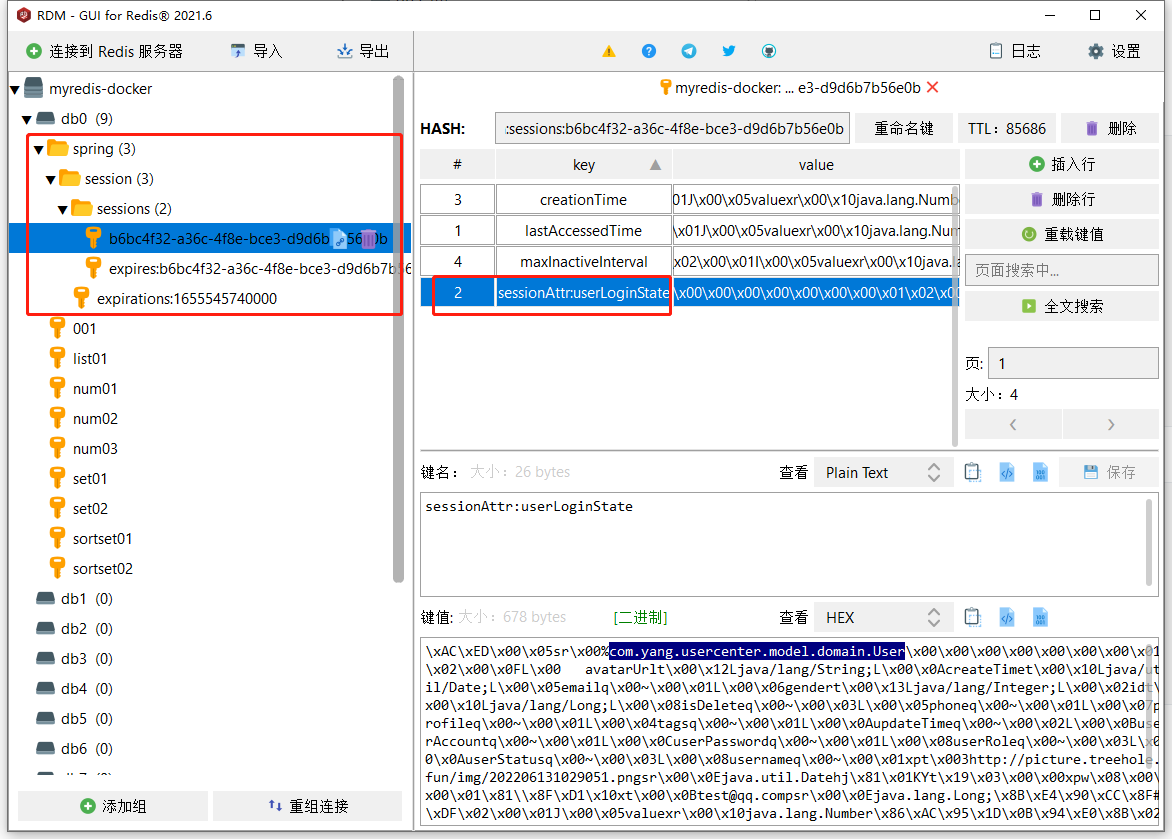
#You can see that the user login session has been stored in redis, so I log in at port 8080 and can also get it at 8082 Login session information:
Login:
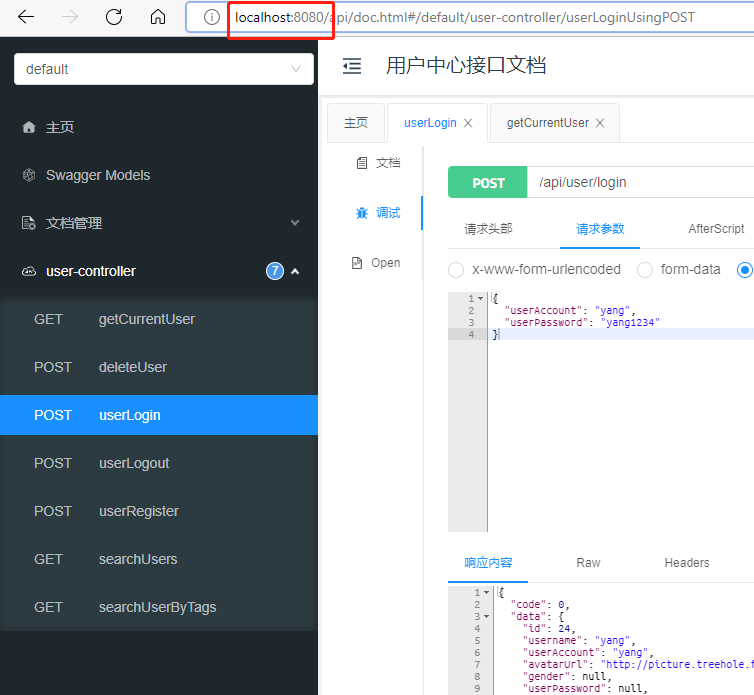
Obtain information:
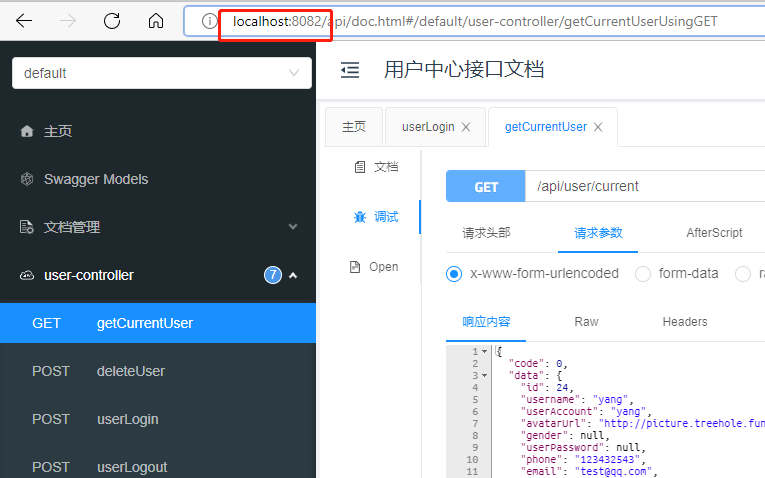
In this way, through redis Achieve session sharing;
Note: the introduced redis and spring-redis dependency versions need to be close.
The above is the detailed content of What is the method for redis to implement session sharing?. For more information, please follow other related articles on the PHP Chinese website!

Hot AI Tools

Undresser.AI Undress
AI-powered app for creating realistic nude photos

AI Clothes Remover
Online AI tool for removing clothes from photos.

Undress AI Tool
Undress images for free

Clothoff.io
AI clothes remover

AI Hentai Generator
Generate AI Hentai for free.

Hot Article

Hot Tools

Notepad++7.3.1
Easy-to-use and free code editor

SublimeText3 Chinese version
Chinese version, very easy to use

Zend Studio 13.0.1
Powerful PHP integrated development environment

Dreamweaver CS6
Visual web development tools

SublimeText3 Mac version
God-level code editing software (SublimeText3)

Hot Topics
 Solution to 0x80242008 error when installing Windows 11 10.0.22000.100
May 08, 2024 pm 03:50 PM
Solution to 0x80242008 error when installing Windows 11 10.0.22000.100
May 08, 2024 pm 03:50 PM
1. Start the [Start] menu, enter [cmd], right-click [Command Prompt], and select Run as [Administrator]. 2. Enter the following commands in sequence (copy and paste carefully): SCconfigwuauservstart=auto, press Enter SCconfigbitsstart=auto, press Enter SCconfigcryptsvcstart=auto, press Enter SCconfigtrustedinstallerstart=auto, press Enter SCconfigwuauservtype=share, press Enter netstopwuauserv , press enter netstopcryptS
 Golang API caching strategy and optimization
May 07, 2024 pm 02:12 PM
Golang API caching strategy and optimization
May 07, 2024 pm 02:12 PM
The caching strategy in GolangAPI can improve performance and reduce server load. Commonly used strategies are: LRU, LFU, FIFO and TTL. Optimization techniques include selecting appropriate cache storage, hierarchical caching, invalidation management, and monitoring and tuning. In the practical case, the LRU cache is used to optimize the API for obtaining user information from the database. The data can be quickly retrieved from the cache. Otherwise, the cache can be updated after obtaining it from the database.
 Caching mechanism and application practice in PHP development
May 09, 2024 pm 01:30 PM
Caching mechanism and application practice in PHP development
May 09, 2024 pm 01:30 PM
In PHP development, the caching mechanism improves performance by temporarily storing frequently accessed data in memory or disk, thereby reducing the number of database accesses. Cache types mainly include memory, file and database cache. Caching can be implemented in PHP using built-in functions or third-party libraries, such as cache_get() and Memcache. Common practical applications include caching database query results to optimize query performance and caching page output to speed up rendering. The caching mechanism effectively improves website response speed, enhances user experience and reduces server load.
 How to upgrade Win11 English 21996 to Simplified Chinese 22000_How to upgrade Win11 English 21996 to Simplified Chinese 22000
May 08, 2024 pm 05:10 PM
How to upgrade Win11 English 21996 to Simplified Chinese 22000_How to upgrade Win11 English 21996 to Simplified Chinese 22000
May 08, 2024 pm 05:10 PM
First you need to set the system language to Simplified Chinese display and restart. Of course, if you have changed the display language to Simplified Chinese before, you can just skip this step. Next, start operating the registry, regedit.exe, directly navigate to HKEY_LOCAL_MACHINESYSTEMCurrentControlSetControlNlsLanguage in the left navigation bar or the upper address bar, and then modify the InstallLanguage key value and Default key value to 0804 (if you want to change it to English en-us, you need First set the system display language to en-us, restart the system and then change everything to 0409) You must restart the system at this point.
 How to use Redis cache in PHP array pagination?
May 01, 2024 am 10:48 AM
How to use Redis cache in PHP array pagination?
May 01, 2024 am 10:48 AM
Using Redis cache can greatly optimize the performance of PHP array paging. This can be achieved through the following steps: Install the Redis client. Connect to the Redis server. Create cache data and store each page of data into a Redis hash with the key "page:{page_number}". Get data from cache and avoid expensive operations on large arrays.
 Can navicat connect to redis?
Apr 23, 2024 pm 05:12 PM
Can navicat connect to redis?
Apr 23, 2024 pm 05:12 PM
Yes, Navicat can connect to Redis, which allows users to manage keys, view values, execute commands, monitor activity, and diagnose problems. To connect to Redis, select the "Redis" connection type in Navicat and enter the server details.
 How to find the update file downloaded by Win11_Share the location of the update file downloaded by Win11
May 08, 2024 am 10:34 AM
How to find the update file downloaded by Win11_Share the location of the update file downloaded by Win11
May 08, 2024 am 10:34 AM
1. First, double-click the [This PC] icon on the desktop to open it. 2. Then double-click the left mouse button to enter [C drive]. System files will generally be automatically stored in C drive. 3. Then find the [windows] folder in the C drive and double-click to enter. 4. After entering the [windows] folder, find the [SoftwareDistribution] folder. 5. After entering, find the [download] folder, which contains all win11 download and update files. 6. If we want to delete these files, just delete them directly in this folder.
 PHP Redis caching applications and best practices
May 04, 2024 am 08:33 AM
PHP Redis caching applications and best practices
May 04, 2024 am 08:33 AM
Redis is a high-performance key-value cache. The PHPRedis extension provides an API to interact with the Redis server. Use the following steps to connect to Redis, store and retrieve data: Connect: Use the Redis classes to connect to the server. Storage: Use the set method to set key-value pairs. Retrieval: Use the get method to obtain the value of the key.






